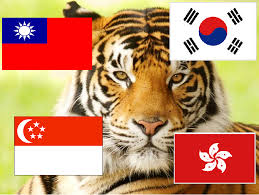Mahathir lupa ke bohong?

Eric See-To
Tun Mahathir says that without GST, Malaysia was also able to become an Asian Tiger.
To correct Tun Mahathir, we were never one of the 4 Asian tigers – which were Hong Kong, Singapore, South Korea and Taiwan.
However, Malaysia was known as one of the Tiger Cub Economies then which also included Indonesia, the Philippines, Thailand and Vietnam.
A big part of Malaysia’s fast growth in the 1990s were due to the Plaza Accord agreement where the western countries signed with Japan on September 22, 1985 at the Plaza Hotel in New York City where Japan was essentially forced to appreciate their currency as Japan’s exports based on a cheap currency were hurting these western countries.
Within a few years, the yen sharply appreciated and more than doubled against the US Dolalr and other currencies.
The sharp appreciation of the yen, then the Taiwanese dollar and the South Korean won encouraged the relocation of Japanese, Taiwanese and South Korean industries to China and Southeast Asia, including Malaysia. This new wave of foreign direct investment helped to usher in a decade of rapid growth that only ended when the East Asian financial crisis erupted in July 1997.
Without the Plaza Accord, Mahathir would not have those years of strong growth in the early 1990s.
This is why countries around us see the same pattern of growth and growth rates (see picture) during the period where Mahathir calls his “golden age”. It wasn’t unique to him nor to Malaysia but because Japan was forced by their now expensive currency to urgently move their factories elsewhere since they needed a cheaper base of production.
Without sounding ungrateful as Mahathir still did his part Mahathir and Malaysia in the 1990s was also fortunate beneficiary of circumstances then and he should not take 100% of the credit.
However, Mahathir’s Malaysia did not need GST then as they had other sources of funds – many of which are not available to us now.
For one, Mahathir borrowed heavily and quickly until we even reached a debt to GDP ratio of 103.4% in 1986. This ratio stayed above 60% for ten years. Compare this to the 50.7% ratio now.
Unlike now, Malaysia also had high corporate taxes and personal income taxes of more than 30%. Instead, PM Najib Razak reduced these taxes from 28% to 24% now while also reforming the personal tax system where many individuals with monthly income below RM4,000 do not need to pay any income tax anymore.
On top of the 10% to 20% sales tax and 6% service tax, Mahathir also imposed a sales tax of 19.64 sen per liter for diesel and 58.62 sen per liter for petrol for much of the 22 years he was in charge.
That is right, Mahathir never subsidized petrol but taxed petrol instead as global prices of oil was much lower than at US$10 to US$20 per barrel for much of his time in charge compared to US$60 per barrel now.
This 58.62 sen petrol tax was only abolished in June 2004.
Tun Mahathir also did not subsidize rice, palm oil or sugar much during his time as there was simply no need as global prices for these commodities then was low.
I invite you to check the historical global prices for these commodities during his time.
Privatization is another name of selling off shares in Government assets in return for money to the government.
Mahathir did this a lot. Among many others, he sold big parts of our Telekom Malaysia, our Tenaga, our stock exchange, many of our ports such as Port Klang and Kuantan port, some of our banks, all our airports, our national airlines, our Penang Bridge, our postal services and even our lembaga padi beras too.
You name it, he probably sold it.
Mahathir also raided Petronas funds frequently to build his pet projects such as KLCC for bailouts for family members as alleged by the opposition including Anwar Ibrahim.
This is why Petronas cash balances were typically in the region of RM20 billion to RM30 billion during his time while it is now RM128.2 billion as at end of year 2017. In comparison, PM Najib shows a lot more respect for Petronas and prefers to let Petronas have enough funds to grow their business.
To top it all, Mahathir also did not implement cash transfer systems such as BR1M.
The cronies got big parts of our economy and our government assets but the rakyat were not paid anything directly yearly in the same way as BR1M does.
As for the often used urban legend of Tun Mahathir saving Malaysia in the 1998, I would like to ask who was the Prime Minister then who had led Malaysia into a position that needed Mahathir to save Malaysia?

